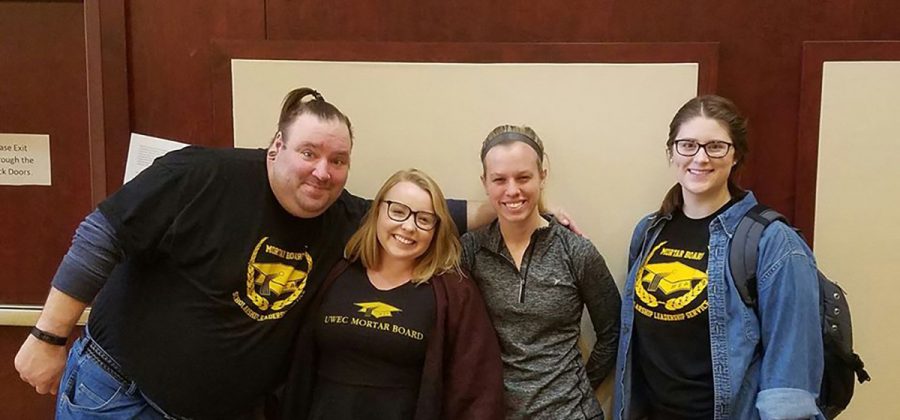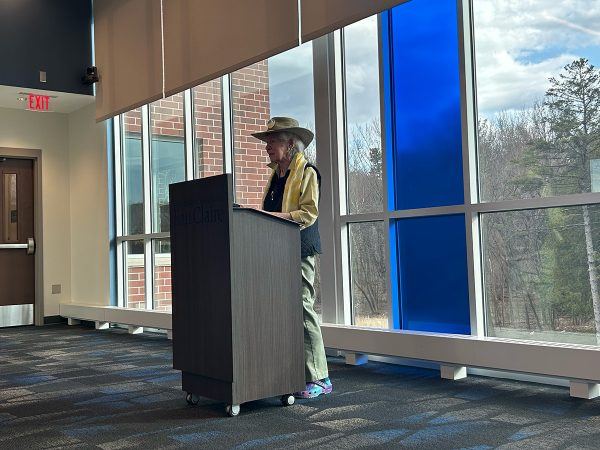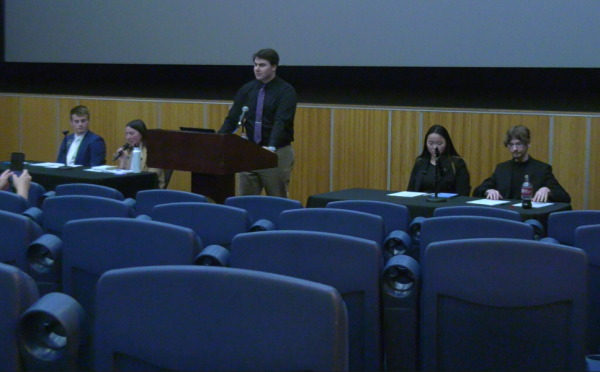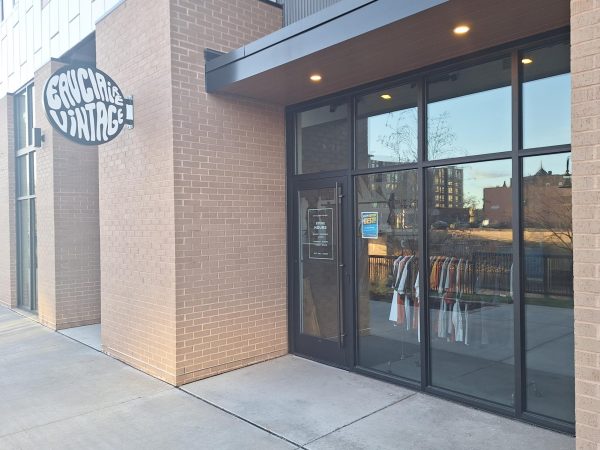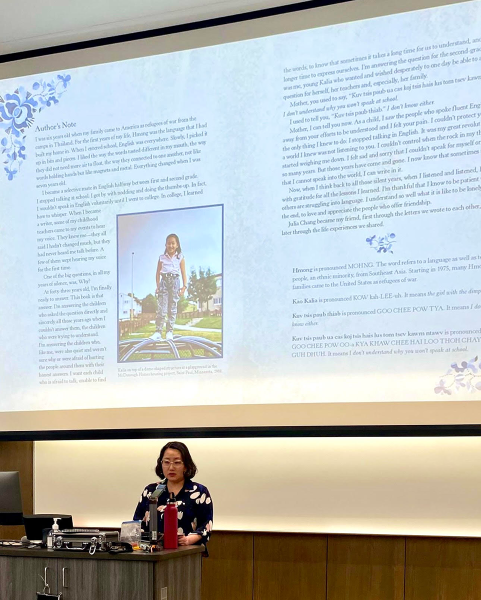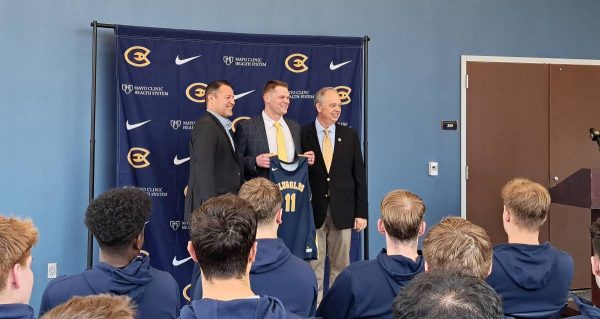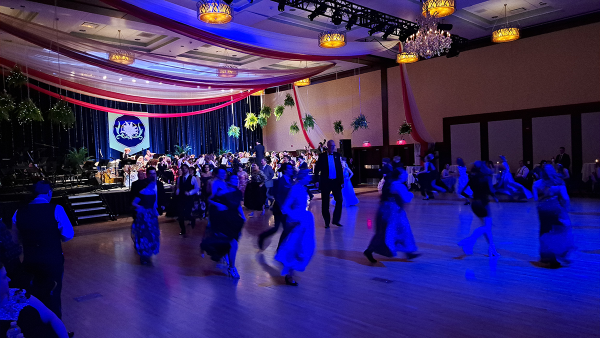Being smart isn’t everything for one honor society
Mortar Board President Melanie Daas embraces people who aren’t your typical honors students
Photo by SUBMITTED
Melanie Daas and Justice Varsho participate in Mortar Board, an honor society on campus for juniors and seniors.
February 15, 2017
The college years are made up of many elements, but one that celebrates accomplishments and encourages advancement in all forms is found in honor societies.
Collegiate honor societies began in the days of the American Revolution with Phi Betta Kappa in 1776, and as colleges continued to be founded into the 1900s, honor societies’ popularity grew with them.
Mortar Board Honor Society is made up of junior and senior students on campus and prides itself on upholding three core values: scholarship, leadership and service. Students from all majors are chosen to join a chapter among 231 across the nation.
With 24 members and two advisors, UW-Eau Claire’s chapter of Mortar Board contributes to the 250,000 members who have been inducted over time as part of the organization’s history.
Three women started the group in 1918 at four separate universities, and women ruled the group for 57 years, before Title IX was enacted in 1975, including men in the group to a previous all-female society. This act eliminated sex discrimination within groups.
There are 15 honor societies on campus, some specific to different majors or departments and others, like Mortar Board, that encompass all majors. Each of them have different keystones, values upon which they base their group. These vary widely, from service, leadership and scholarship to knowledge, excellence and advancement, a mere few examples.
Melanie Daas, a senior social work student at Eau Claire, dedicates time each week to Mortar Board, between weekly Executive Board meetings and biweekly general meetings. She strives to embody the core values in her daily life and work with others to find the best possible opportunities. As the president of Mortar Board, she brings all the members together and facilitates the work they do.
Daas is currently in her second semester as president and is planning to continue until she graduates next year.
She has been involved with Mortar Board for two years. As time went on, she became the events coordinator and after one semester in that role, she became the president.
At the time of her involvement, she received multiple invitations from several honor societies and had to decide which one was the best for her. When Daas was sought out for applying to Mortar Board, a note at the bottom of the email stood out to her as something a bit different.
“One of my biggest barriers was that at that time, I couldn’t afford to pay, like, 90 dollars every year to keep up a membership,” Daas said. “When I got my Mortar Board email and letter, just in a spot at the bottom it said ‘we don’t ever want to turn someone away because they are not able to pay their membership … if you can’t pay that, we’ll help you pay it … there was something very different about that to me.”
Mortar Board members are asked to pay a one-time $80 fee, which is negotiable. To be inducted for the pillar of scholarship, the society looks for students with a GPA of 3.4 or higher. Mortar Board is a junior and senior honor society and looks for students who are invested in their academics, give back to their community and are a part of different organizations on campus.
They also look for students who are active within the campus community, participating in clubs and holding leadership positions. These two units make up the pillars of service and leadership.
However, Daas said students who may be lacking a high GPA could be considered if they stand out in other ways. For example, if a candidate was very active in the campus community and reenacted the values of scholarship, leadership and service, the honor society would consider making an exception.
Every week, Daas puts in about five hours of work for Mortar Board through meetings and individual duties.
As part of the campus community, Mortar Board co-sponsors the Chancellor’s Roundtable discussion once a month. The group sells roses at the commencement ceremony. The group also hosts an event called “Kids in STEM,” where children from the community come to campus to learn about science, technology, engineering and math from college students, professors and community members.
Justice Varsho, an English rhetoric of science, technology and culture senior and non-traditional student is a member of Mortar Board.
Varsho has participated in Mortar Board since the spring of 2014 and has helped out with various efforts, like the trash pick-up around campus, book boxing and the rose sale at Commencement. Varsho said Daas is a great leader in the Mortar Board society because of her never-waning smile.
“You can’t be sad around her,” Varsho said. “I’ve seen her stressed, and she always has a smile on her face. She is always willing to go the extra mile for her classmates.”
Varsho also has a job and consequently is unable to make some of the meetings. With Daas’ help, he has been able to make up the points and still fulfill the requirement. Points measure an individual’s participation and there is a certain number required each year to remain in good standing with the organization.
When Varsho was without a car in the winter, he asked Daas to drive him home, and she helped him in each circumstance without hesitation. She also helped him with other academic endeavors.
“She has offered multiple times to look at some of the papers I’ve written in the writing center … “Her smile is infectious and that is how she empowers people,” Varsho said.
Paula Stuettgen, the non-academic advisor for Mortar Board, was on the National Council for the honor society and has advised the Eau Claire chapter since 1984. She, along with the faculty advisor, Claire Lindstrom, both participated in Mortar Board while they were in college.
Stuettgen said Daas’ involvement in Mortar Board is inspiring and wonderful to see.
“I think she pretty much embodies the whole commitment to scholarship just in the fact that she has an excellent scholastic record,” Stuettgen said. “She embodies leadership … in that she is always looking for ways for Mortar Board to be a contributing organization on our campus and to make sure that our members are served well by what Mortar Board does in terms of providing programming at the meetings and events and things like that.”
Her openness to change is another valuable asset to the organization, Stuettgen said.
Claire Lindstrom, the faculty advisor, said the advisors attend meetings when they can, but want to emphasize the student-run aspect of the organization. Lindstrom is the program manager for Eau Claire’s office of Continuing Education and works with non-traditional students. Through her role with Mortar Board, she can connect with traditional students as well as non-traditional students, like Varsho, she said.
Lindstrom echoed Stuettgen and said Daas is a go-getter and has the natural leadership qualities required to get the job done.
“She has done a great job spearheading this group,” Lindstrom said, “and I look forward to seeing what the group does the rest of this semester.”

